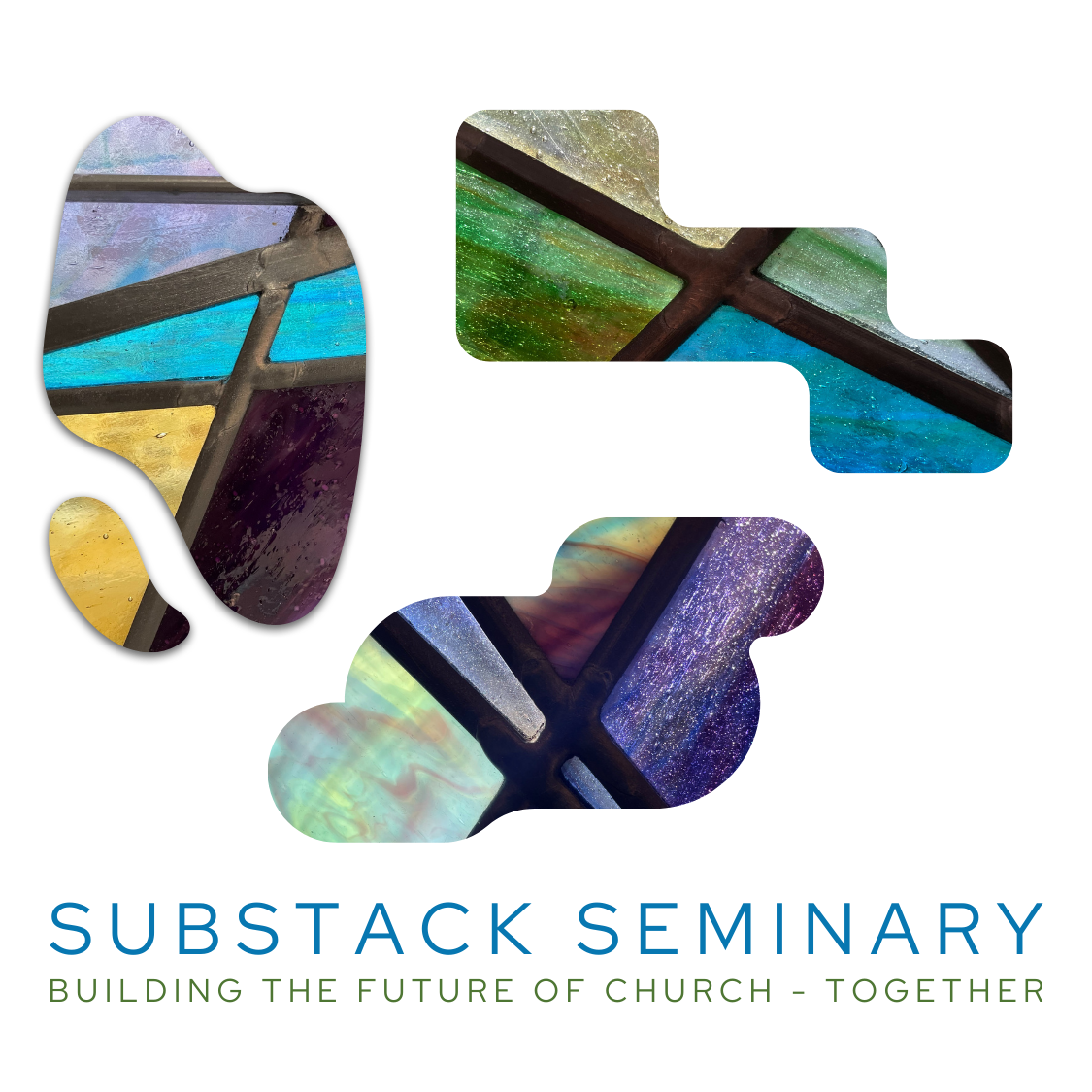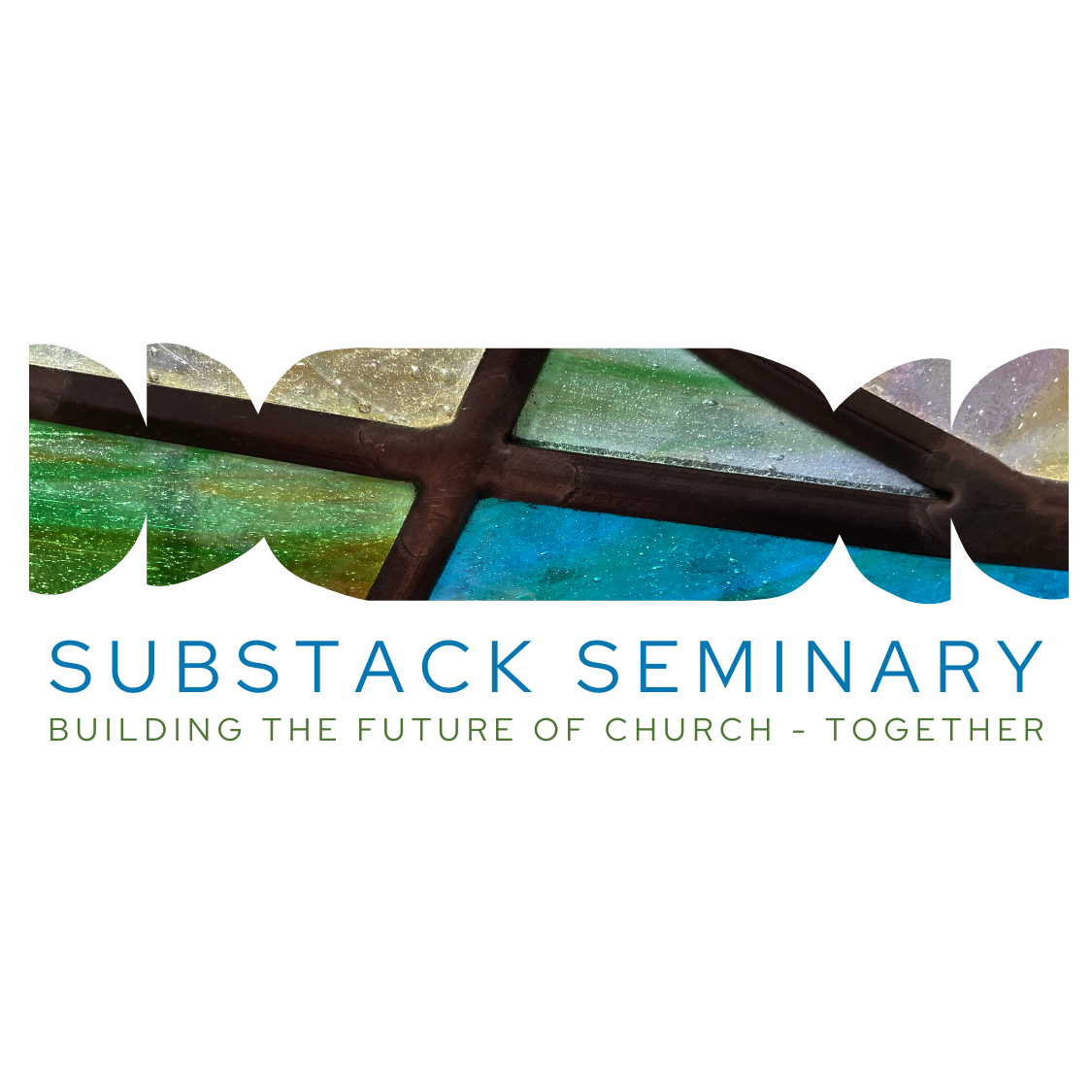You're not weird - you're early
You’re doing ministry that doesn’t fit the boxes.
Maybe you’re a full-time congregational minister who also consults and writes books. Maybe you’re serving a tiny congregation while building something online. Maybe you’ve retired - or left parish ministry entirely- but you’re still called to share the Gospel. You’re just doing it through writing, workshops, or digital community.
You’re hustling across multiple income streams. You’re working part-time here and freelance there. You’re patching together a ministry that feels deeply faithful, but looks nothing like what you were trained for.
And you’re exhausted. Not just tired - spiritually weary.
Because you’re trying to make institutional systems work for a world that no longer exists. You’re translating ancient wisdom into modern life while also trying to figure out how to pay your bills. And wondering if what you’re doing is really helping others follow Jesus.
The institutional church is collapsing. You know it. Everyone knows it. But the Gospel is still the center of your life. You still believe Christian community is essential. You’re just not sure where you fit in the life of the church.
Meanwhile, the church keeps churning out ministers in the same model.
When I was in seminary (late 90s), we were blithely unaware that the church we were being prepared for: a building, salaried clergy and staff, a set of programs, and a set congregation that could easily support all of this - was already a model teetering on unsustainability.
It shocks me that students are still being prepared for ministry today in a way that presumes this model - even though most churches no longer work this way (or struggle to hold it together if they do), and most clergy serve outside of - or tangential to - this model.
Now we’re in a place where our formation and expectations about what church is and how it functions are becoming radically different from what we were prepared for.
And you know what?
From what I can see, we’re doing pretty well out here in the new frontier.
Every time I turn around, I meet a new minister who is cutting a trail through the weeds and bringing the Christian tradition into new territory - or back into the institution to try and shore it up as it crumbles.
And also - this is part of the exhaustion. We’re each blazing our own trails. We’re still doing all the things while trying to also have families and lives. This is part of the old system of church that can definitely die, as far as I’m concerned!
We’ve pushed this far into how to do and be church differently. Let’s do this together.
Meet my colleague and friend Loren Richmond Jr.
He works as a hospital chaplain. He also consults with a nonprofit that supports worship leaders. He runs his own organizational consulting business called Resonate Purpose. He co-hosts a podcast called Future Christian. He’s active in his UMC congregation. And he works part-time so he can be present for his kids while his wife works a demanding full-time job.
He has an innovative, creative ministry that he’s built and grown by himself, finding his own way.
This is what he says:
‘For the longest time, I thought I was just weird or different, but recently it has struck me that I am just early; meaning my ministry and how it is structured is very early for the future, post-denominational, post-institutional world coming. ‘
His ministry structure—multi-vocational, post-denominational, project-based, digitally connected—isn’t the exception anymore.
It’s the shape of the future of church that’s already here.
And here’s the hard part:
Even though he’s doing innovative, faithful, needed work, he can’t get traction to collaborate or serve in new ways with the institutional church (this is a frustration we share).
Entrenched systems promote from within. They reward people who play by existing rules. Meanwhile, people like Loren - like me, maybe like you? - who could actually help the church navigate the future - are stuck on the margins, working hard for small paychecks, dependent on a spouse’s income, wondering if they’ll ever be financially stable.
In the meantime, the institution sits behind the closed doors of fear and denial.
It’s time to bring church to people
The time we are living in is about institutional collapse. Which is not the same thing as the death of the church. In fact, we see today that there is a revival of Christian faith in many corners.
Frankly - though I can’t prove it - I believe this is because innovative ministers are finding new ways to share the Gospel. From within the institution, beyond the institution, and alongside the institution.
But it’s not easy. Especially when we’re doing it alone.
People are hungry for sacraments, for ancient practices, for Gospel-centered community. They’re just not finding it in Sunday-morning-only, building-centered, denominationally-siloed institutions. Or they’re not finding it exclusively there.
They’re finding it online. In books. On retreat. In podcasts. In workshops. In digital communities. In small, nimble, networked ministries that meet them where they already are.
You know this, because you are there. You’ve gotten this far on faith and persistence (and a heck of a lot of skill) alone.
Now it’s time to learn to do it together. For the sake of the church - and for the sake of those of us who’ve come this far.
The church has reinvented itself before.
When Constantine made Christianity the official church of the empire, the church moved from catacombs to cathedrals. When the printing press was invented, the Reformation exploded into being. When missionaries traveled across oceans, the church adapted to new cultures.
We’re living through another one of those moments. The digital age isn’t just changing how we do ministry—it’s changing what ministry is.
Right now, innovative ministers are scattered. Isolated. We’re each figuring this out alone, wondering if we’re the only ones. We’re doing everything ourselves - nurturing our own creative spirits on the sidelines. We’re building something faithful but financially precarious.
The institutional church can’t help us (yet) because it’s structured for a world that no longer exists. Traditional seminary can’t train us (yet) because it’s preparing people for a system that is disappearing.
(I say ‘yet’ because I believe part of innovative ministry is building that bridge for traditional denominations and seminaries. We can help them move into the future - if they’ll let us).
We need each other. We need to pool our wisdom - and frankly, our resources - share our gifts, support each other’s wisdom and faithfulness, grow each others’ communities.
We need to model Christian discipleship - and the leadership of the earliest church - to share what we have, and build what we’re called to.
Loren is my founding partner in Substack Seminary.
Because he figured out the same thing that I have - and that you may have, too: you’re not weird. You’re just early.
And now you’re right on time.
Imagine a year from now: your ministry has a sustainable structure. You can explain your “why” with clarity. You have a network of colleagues you can rely on for support - maybe even collaborate with. You know how to use the digital tools and platforms you need. You’re financially stable - or at least you have a roadmap to get there.
Imagine looking at your calendar and seeing a ministry that actually allows you life faithful, restful life - and uses your gifts to follow your calling to follow Jesus in this new age.
Imagine not feeling isolated anymore. Not feeling like you’re constantly beating your head against the wall of what’s not working, or wondering how long you can sustain what is.
You’re bringing church to people.
Welcome to Substack Seminary. Let’s build the future of church - together.





